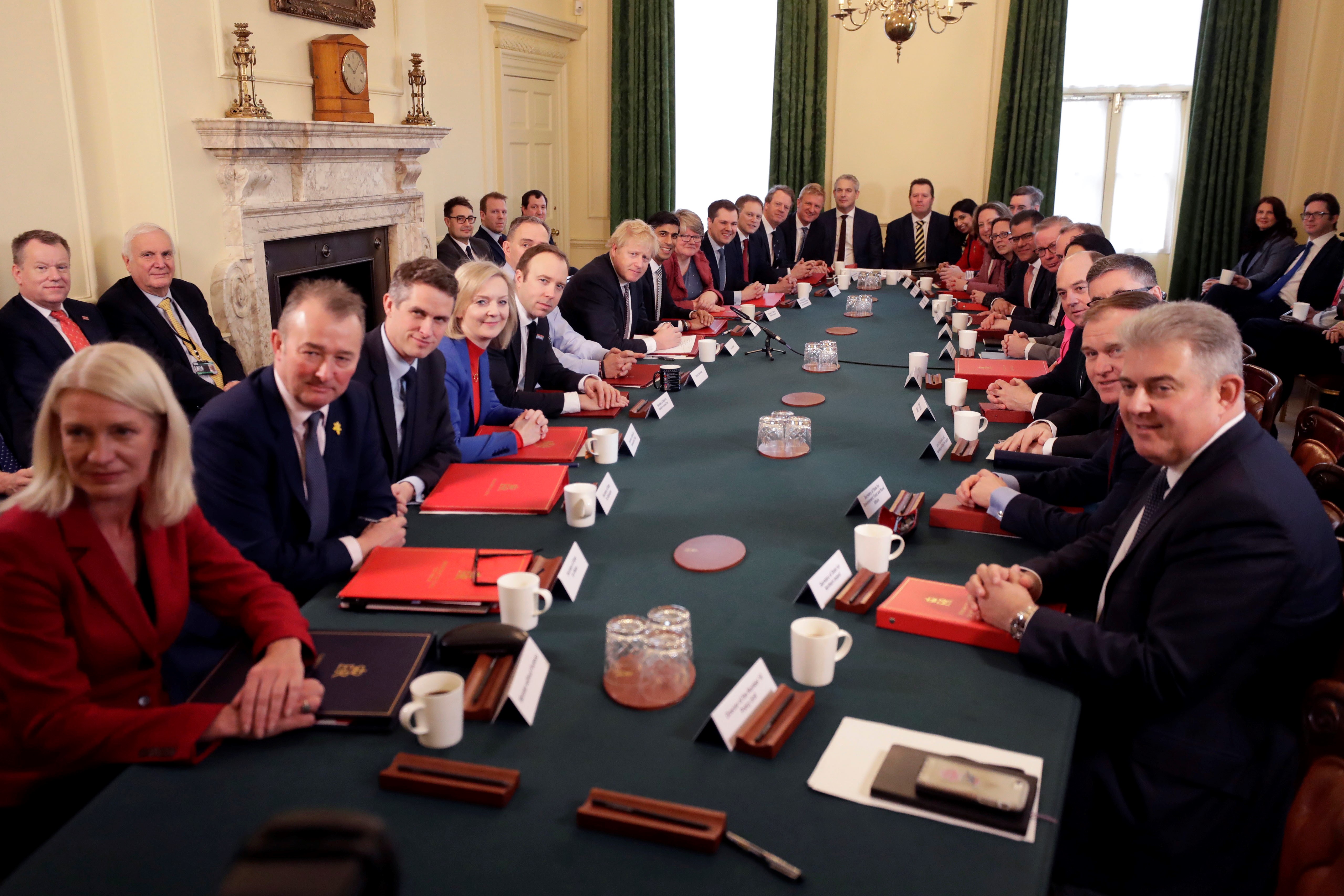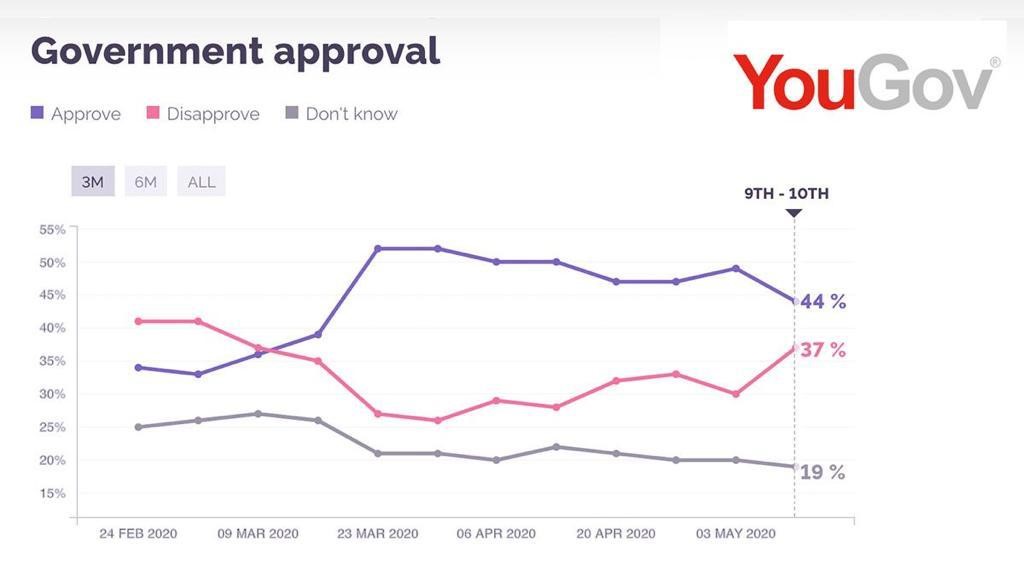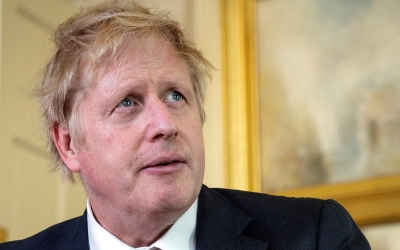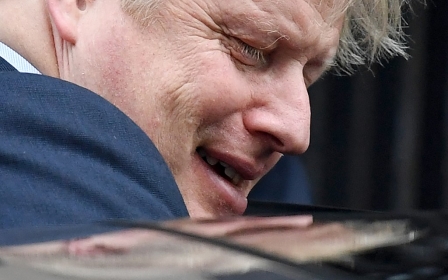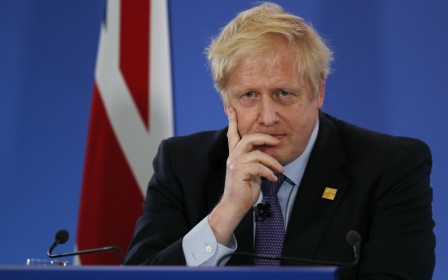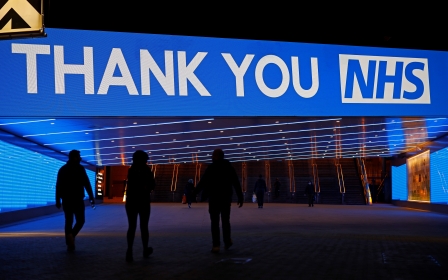UK coronavirus crisis: Boris Johnson cannot afford more errors
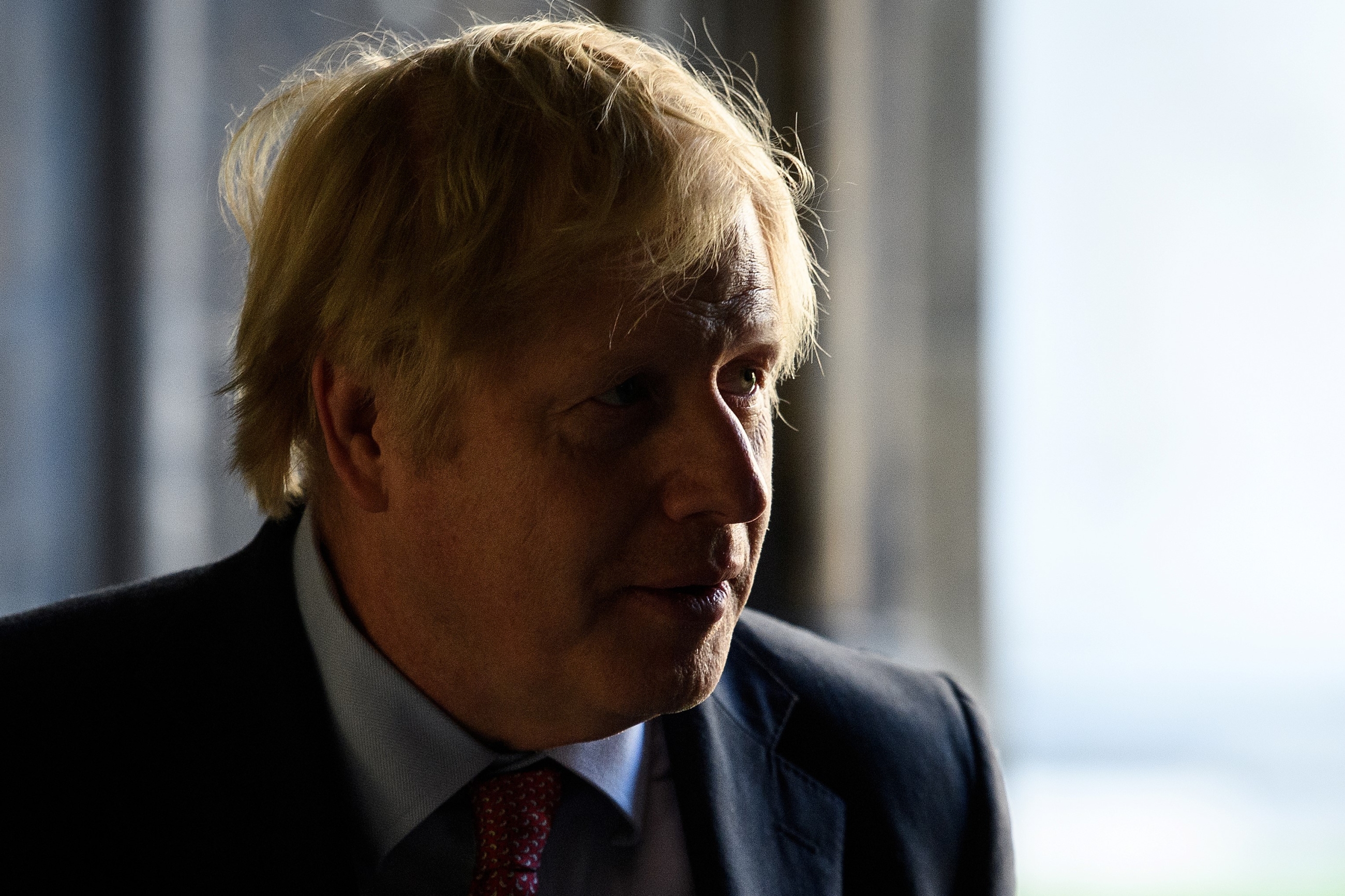
Many will disagree, but I thought British Prime Minister Boris Johnson performed well with his address to the nation on Sunday evening.
He looked serious. The jokey and dishevelled figure who bungled his way through the early weeks of the coronavirus pandemic was no longer in evidence. Admittedly, Johnson’s address was pre-recorded, but he made sense and looked in command of his brief.
I’m fairly certain that most of the 30 million deeply concerned British citizens who switched on their televisions to watch Johnson felt the same as me.
Losing authority
The prime minister is far more popular than many of the chattering classes realise. He is fun. He’s likeable. His personal battle with the illness last month caught the sympathy of the nation.
New MEE newsletter: Jerusalem Dispatch
Sign up to get the latest insights and analysis on Israel-Palestine, alongside Turkey Unpacked and other MEE newsletters
Throughout this crisis, Johnson has consistently tried to govern Britain along the presidential model of the United States, and engaged directly with the people
But the prime minister is, nevertheless, slowly losing authority. It would be unfair to say that his statement on Sunday night has fallen to pieces. Unfortunately, it's the case that government figures who made the broadcast round the following morning did not know what they were talking about.
Tory MP Andrew Bridgen was embarrassingly incapable of fielding questions from Piers Morgan on Good Morning Britain. The foreign secretary, Dominic Raab, created confusion by saying it would be possible for people to meet both their parents as long as they were outside and maintained social distancing rules. The government quickly put out a clarification that this was not true.
A great deal of this communications shambles would have been avoided if the prime minister had done something he hates doing. Obeyed the rules.
We in Britain live in a parliamentary democracy. This means that the prime minister is accountable first and foremost to parliament. Throughout this crisis, Johnson has consistently tried to govern Britain along the presidential model of the United States, and engaged directly with the people.
Indeed, he has ignored the House of Commons.
Avoiding scrutiny
Before last Monday, so far as I can discover, the prime minister had not made a single statement to the Commons on coronavirus. Repeat - not a single statement about the most serious public health emergency to strike Britain in a century.
I detect growing anger and resentment inside the Johnson government at the way the pandemic is being managed by a tiny group of senior advisers and cabinet ministers
This is part of a deliberate strategy of avoiding parliamentary scrutiny. For example, Johnson has not appeared before the House of Commons liaison committee at all (something every prime minister is obliged to do three times per year), despite having been prime minister for almost nine months.
And last year in March, Johnson's adviser Dominic Cummings was ruled to be in contempt of parliament after failing to appear before MPs investigating fake news. This didn’t appear to bother Johnson at all, because on becoming prime minister in the summer he appointed him his senior adviser regardless.
Johnson is not simply governing as if parliament does not exist. He is also governing without his Cabinet. I detect growing anger and resentment inside the Johnson government at the way the pandemic is being managed by a tiny group of senior advisers and cabinet ministers.
Apart from Johnson and Cummings, this group comprises the health secretary, Matthew Hancock; the foreign secretary; the Cabinet Office secretary, Michael Gove – who once said Johnson could not “provide the leadership” to lead Britain – and the chancellor of the exchequer, Rishi Sunak.
Other ministers feel cut out of the action. According to a well-informed report in The Times, the new 50-page strategy document was printed before the Cabinet even met.
Kept in the dark
Another report in the Telegraph claims Johnson has actually been obliged to apologise to cabinet ministers who had been kept in the dark. So Boris Johnson is governing without parliament and without the cabinet.
He is also governing as prime minister of England and not Great Britain.
The lack of communication from Britain’s prime minister with the nations that comprise Great Britain is shocking
Scottish First Minister Nicola Sturgeon complained that Johnson’s new slogan to “Stay Alert” was revealed in the Sunday Telegraph before anyone from the devolved nations had seen it, saying: “We should not be reading of each other’s plans in newspapers.”
She’s right.
Sturgeon has made clear that the advice in Scotland remains to stay at home. Wales showed a similar response, with First Minister Mark Drakeford stating: "Our advice has not changed in Wales.” Plaid Cymru criticised Johnson after the address saying he "claims to be the prime minister of the whole United Kingdom but he has acted tonight as England’s prime minister - not a responsible one either."
This lack of communication from Britain’s prime minister with the nations that comprise Great Britain is shocking. Johnson might be able to get away with this strategy of governing on his own, with the aid of Cummings and a tiny hand-picked group of cabinet ministers, if matters were going well.
But they’re not.
Fundamental errors
It is tragically the case that Britain has at present the second-highest number of deaths globally, behind only the US. Earlier today came news courtesy of the PA news agency that the number of deaths in the UK involving coronavirus has passed 40,000.
Don’t forget that it’s just six weeks since the national medical director of NHS England, Prof Stephen Powis, said: “If we can keep deaths below 20,000 we will have done very well in this epidemic."
Responsibility for this high death toll can be placed at the door of Downing Street.
The prime minister has been responsible for a series of fundamental errors. The first was his failure to take coronavirus seriously. As the Sunday Times revealed, he failed to attend any of the first five emergency Cobra meetings on the pandemic. Not one.
The newspaper quoted an adviser to Johnson saying: "There’s no way you’re at war if your PM isn’t there. What you learn about Boris was he didn't chair any meetings. He liked his country breaks. He didn't work weekends. It was like working for an old-fashioned chief executive in a local authority 20 years ago. There was a real sense that he didn’t do urgent crisis planning.”
The second error was to adopt a strategy of so-called "herd immunity" rather than introducing a national lockdown. Defenders of Johnson say this mistake falls at the feet of the scientists.
But as one of the government’s advisors on coronavirus, Patrick Vallance, told parliament’s Health and Social Care Committee last month: “Decisions are informed by science, they’re not led by science.” He added, “those are decisions which ministers must take.”
It looks like the gradual lifting of lockdown rules announced by the prime minister this week is a third mistake. In the past week, a rash of newspaper headlines said that the British people were going to be sent back to work, only for a rapid u-turn the following day.
I’m sympathetic with Johnson on this. There is no evidence that he was personally responsible for the mishandling of the messaging. There is bound to be confusion at this complex moment when lockdown rules are lifted.
Crucially, Johnson remains popular.
A delicate stage
For all of his mistakes and errors of judgement, his government still has a positive approval rating of 44 percent, according to the latest statistics from YouGov. Ominously though, that rate has started to head downwards. YouGov reported that it was the first time the British government had had a net positive approval rating for nearly a decade.
We are entering the most delicate stage of the crisis when the economic consequences will start to strike home. The prospect ahead is terrifying
These are figures any ordinary prime minister would die for. The Tories also hold a colossal 20-point lead over Labour. Nevertheless, I sense Johnson cannot afford more errors.
We are entering the most delicate stage of the crisis when the economic consequences will start to strike home. Britain (in common with many other countries) faces a long period of mass unemployment. Many businesses will fail.
Many more people will die. The prospect ahead is terrifying.
At times of national emergency, it is natural for frightened people to place their faith in the prime minister or president. Even US President Donald Trump, whose handling of coronavirus has been as shambolic and incompetent as one can imagine, has approval ratings hovering around 45 percent.
These popularity ratings guarantee Johnson’s security for the time being, but I sense that a further set of mistakes could see the national mood turn against him. Of course, the country may come relatively smoothly out of lockdown and the death rate fall back. Let's hope and pray that happens.
The coronavirus pandemic has been compared – not least by Johnson himself - to a conflict.
In search for a leader
Britain fought two great wars in the last century. In both cases, the prime minister who led Britain to war was ousted before the end – Asquith in 1916 and Chamberlain in June 1940.
It is true that Johnson has recently won a general election and commands a parliamentary majority of 80 seats. That does not guarantee him safety.
Britain needs a leader. We have all heard so much about this quality in the last two decades. Former Labour party leader Jeremy Corbyn was said to lack it. Former prime ministers Tony Blair, David Cameron and Theresa May were all pronounced leadership material, but all made disastrous mistakes.
Thus far, Johnson has the faintly desperate air of a man who is trying to ape leadership. But does he really have it? We know that he admires Winston Churchill. But is he more than a Winston Churchill tribute act? Has he got the ability to plot a course and stick to it?
He's not shown that ability yet. This current situation requires someone who can steer Britain through a logistical nightmare. To head off a health emergency while avoiding economic disaster. This is not a challenge for which anything he has done in the past has prepared Johnson.
Lessons from history
There have been three cases in the last 100 years where Conservative prime ministers with apparently secure majorities have been forced to stand down.
The Conservative party is a ruthless electoral machine. If it needs to dispose of Johnson, it will do so
In 1940, a Conservative Party revolt put an end to Chamberlain’s premiership. Anthony Eden resigned through ill health in order to escape the ignominy of being forced from office after the Suez fiasco of 1956.
The men in grey suits came for Margaret Thatcher in 1990 even though she’d won a triumphant third term as Tory prime minister three years earlier. Towards the end of her premiership, she made some of the mistakes that Johnson is making today. She believed her own publicity. She neglected her MPs. And she insulted her cabinet.
Yet her mistakes were nowhere near as serious as those already made by Johnson over coronavirus. There are alternatives to Johnson. They include the prime minister’s defeated rival in last year's Tory leadership election, Jeremy Hunt. Inside the cabinet, Sunak, chancellor of the Exchequer, is probably the most likely figure.
The Conservative party is a ruthless electoral machine. We have not reached that stage yet. Nowhere near. Yet, if the errors pile up, the public loses faith, and if Johnson continues to ignore his cabinet and snub parliament as he has done over the last few days, the Conservative party will dispose of Johnson with relish.
The views expressed in this article belong to the author and do not necessarily reflect the editorial policy of Middle East Eye.
Middle East Eye delivers independent and unrivalled coverage and analysis of the Middle East, North Africa and beyond. To learn more about republishing this content and the associated fees, please fill out this form. More about MEE can be found here.



